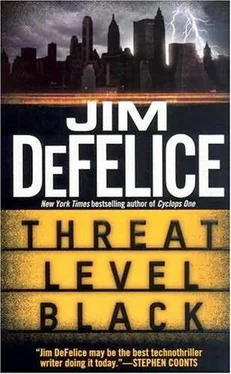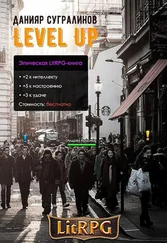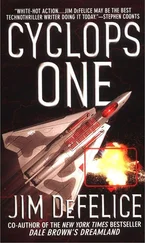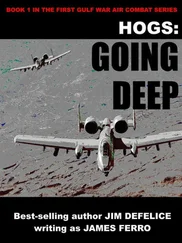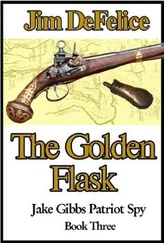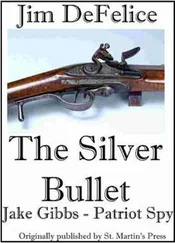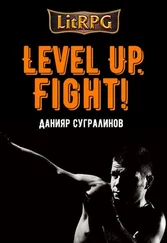Fisher took an awkward step forward with his shoeless foot. The terrorist had taken off or lost his night vision goggles. They were twelve feet apart.
“Better watch where you’re going,” said the agent as Faud edged down the tunnel. “Lights are going to come on and you’re going to fry yourself.”
Faud took a step backward, then another.
“Mrs. DeGarmo says hi,” said Fisher.
Faud didn’t answer.
“I didn’t think that was going to work,” said Fisher. “But seriously, now, you better watch where you’re going. Power comes on, this tunnel’s a death trap. Come out with me and we’ll talk.”
“The power won’t be on for months.”
“I wouldn’t count on it. Con Ed’s not nearly as inefficient as everyone thinks.”
“Go to hell.”
“I appreciate the sentiment. And I’m not kidding about the rail. Really.”
Fisher saw the man move his hands. He dropped down, grabbing for the backup Glock he had in a holster on his calf. Before he could fire, a flash of light blinded him.
Then there was an awful sound, something like a scream that twisted in half. The tunnel filled with acrid smoke, the scent of burnt flesh permeating the dank space.
“Told you the lights were coming back on,” said Fisher. “You didn’t think I could keep them off forever, did you? The paperwork alone is ridiculous.”
He holstered his pistol. Faud lay slumped against the third rail, still frying. The can of gas lay in the middle of the tracks, unopened.
“Andy! Andy Fisher!” yelled Macklin.
“Where the hell have you been, Macklin?” asked Fisher, turning back.
“He hit the third rail?”
“Guess he didn’t believe me about the power.” Fisher pulled out his cigarette pack. “You stopped the trains, right?”
“Like you said.”
Fisher lit up. “Good. Only damn place in New York City you can smoke in peace anymore.”
They left it up to the President.
The terrorist was dead, his canisters of sarin gas secured. A thorough search had turned up nothing, there were guards all over the place, and the crowd outside was as patient as New Yorkers could be.
Which wasn’t very.
“I say let’s move on with it,” said the President. “The hell with these terrorist scumbags.”
“You shouldn’t say scumbags,” said one of his advisors.
“You want me to say what I really think of them?”
The man shut his mouth.
The tip-off started at ten P.M., a delay of only an hour and a half. As an added bonus, the network agreed to cut the number of commercials and show the game as it was meant to be played, without interference.
Dr. Blitz left the President just before the end of first half of the game, walking outside with the Secret Service bodyguard to the task force trailer. There he was briefed personally by the Homeland Security agent who had coordinated the operation, Michael Macklin. Macklin, his clothes soiled with dirt and sweat, looked as if had crawled through the sewer to get there.
“We don’t know yet if the man who died down there worked alone or not,” Macklin told him. “He didn’t have an accomplice on the scene that we’ve found, which was one reason we were able to fool him with the temporary blackout. That was supposed to be his signal to begin.”
“Who figured that out?” asked Blitz.
“Andy Fisher,” said DIA agent Kowalski, standing nearby. He had a pained expression on his face. “The Andy Fisher.”
“So Fisher and Colonel Howe were right: It was connected to the UAV and the E-bomb,” said Blitz. “Which means the Korean is still at large somewhere.”
“Or he sold the thing to them before he escaped.”
Blitz turned around. A tall, bedraggled man in a rumbled brown suit stood before him. He was missing a shoe.
“Agent Fisher, how are you?”
“Actually, that’s Special Agent Fisher.” Fisher took a puff on his cigarette. “They screwed up the paperwork somewhere a few years ago and promoted me by mistake.”
Blitz shook his head. As the President said, a real pistol.
“So, where is this Korean?” Blitz asked.
Fisher shrugged. “Not my case.”
“Maybe it ought to be,” said Howe.
“Take it up with the boss,” said Fisher, drawing on his cigarette. “Meantime, I thought I’d go watch the end of this basketball game.”
When dawn broke, Kuong’s ship was several hundred miles from the American coast, well on its way to Africa. Once there, Kuong would make his way to Nigeria, where he would board the first of several airplanes for the flight to Peru. How long it would take to accomplish that journey, he did not know; it would be many days if not weeks, considerably longer than the trip he had taken to board the Beneficent Goddess. But this was necessary, and because it was necessary, he did not mind it.
He had watched CNN via the satellite dish during the night. By the time the clock passed ten and there was no announcement, Kuong knew there would be none. His plan had failed.
He had been reluctant to turn the set off, hoping still that the stories would come. He longed to watch the casualty lists and footage of looters rampaging the city. He wanted to see the parade of ambulances and the somber faces. He would have laughed at their tears.
It was not to be-not now. Revenge would have to be sought far in the future.
Some men would conclude optimistically that failure would make his future success that much more delicious. But Kuong did not believe such lies. Bitterness could never really be washed away. He stood at the bow of the ship, staring at the pink light pushing back the gray of the ocean.
Howe swung the door open. “Home!” he yelled.
He heard his mother talking in the kitchen, muttering about the food or maybe complaining that he was late.
“Hey,” he said, coming through the small dining room.
“Well, about time.” His mother turned from the stove and kissed him. Howe saw she hadn’t been talking to herself but to his friend Jimmy’s wife. They’d just arrived for dinner. “Hey, Deb,” he said to her.
“Hey yourself. And you’re Alice?”
Alice stood in the doorway, a bashful smile on her face. Whether it was the light or the smile or something else, she looked more beautiful than ever.
“How’d you get hooked up with this character?” Deb asked.
“I tried to rent him an apartment.”
As his mother introduced herself, Howe slid toward the back of the kitchen and helped himself to beer. A few minutes later, with the women showing no sign of needing him or even noticing that he was still there, he slipped out the side door and went to find Jimmy. He found him hauling out some brush in the side yard.
“Working for your supper?” he asked his friend.
“I figured I’d at least earn a beer.”
Howe handed him his.
“Don’t mind if I wipe the bottle,” said Jimmy.
“I would if I were you.”
“So? They catch the bastard?”
Howe shook his head. He trusted his friend more than just about anyone in the world, but he still had to be careful what he said. After the first flush of stories, the news reports had been very vague about what had happened, saying there seemed to be a Korean connection but not really explaining. And of course they didn’t know about Howe’s role in it all.
It was clear that the UAVs had been launched at sea. Dalton said the booster would have made it possible. The Navy had several candidates, but thus far the ships they had checked had turned up clean.
More than likely, the man Howe had rescued had been involved in the attack. They knew who he was now: a high-ranking relative of Kim Jong Il who’d commanded a military unit as well as a development facility. He’d been too well known to sneak out of the country on his own-or maybe too cunning to miss the chance of turning his escape into a gesture of defiance against the Americans. It was just a matter of time before they found him, Howe thought.
Читать дальше
